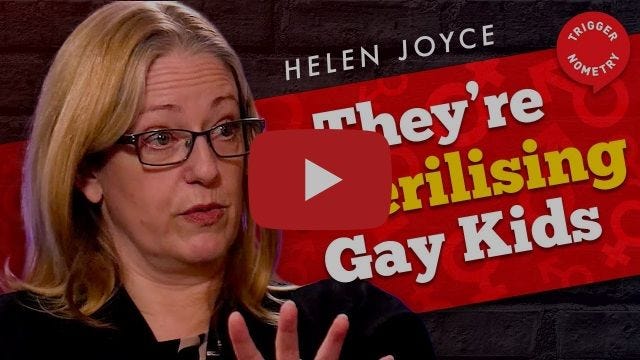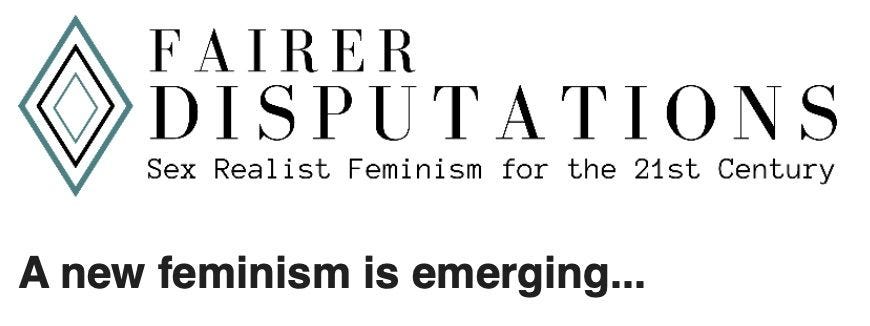Thinking allowed
What I learn from appearing on panels and from being interviewed
I was touched by the response to last week’s edition, in which I waxed somewhat grumpy on the subjects of institutional capture and cowardice. I particularly liked the comment from a reader who says that the best response to friends and acquaintances expressing their dislike of trans ideology but saying they couldn’t say so publicly is to recommend that they support a couple of the organisations working to protect sex-based rights—a “coward tax”, as he put it.
I didn’t want to come across as overly despondent, but if we’re to win this fight, more people—a lot more—are going to have to find their voice. As my colleague Maya Forstater at Sex Matters says: everyone has to level up. If you’ve never said anything at all, try talking to one person who can’t threaten your job. If you stay away from the subject entirely on social media, try liking a tweet. If you’ve only ever liked tweets, try tweeting on the subject just occasionally. And so on.
I’m not downplaying the risks of speaking up—as clearly illustrated in an article published on the Sex Matters website this week, by a freelance writer who was dropped by a specialist publication within hours of it publishing his article criticising transactivism. But this fight will be long and taxing, and everything cannot be left to a small number of voluntary campaigners who then seem to have little wider support and can therefore be misrepresented as extremists.
I’m travelling this week, so this issue will be a little shorter than usual. I thought I’d share the recordings of two recent appearances, and share some reflections they inspired.
If you are not a subscriber to my weekly newsletter, you might like to sign up for free updates. I hope that in the future you might consider subscribing.
One was an an interview I recorded shortly before Christmas with Triggernometry, one of the Britain’s biggest YouTube shows. The show has had plenty of gender-critical voices on before, including Louise Perry, Mary Harrington and Kellie-Jay Keen, aka Posie Parker. But it definitely crosses over to people whose primary interests are not women’s and children’s rights.
Plenty of people are neither knowledgeable about nor interested in feminist theory per se, but can still readily grasp the problems with transactivism for issues of general importance. The resurgence of womens’ activism is what inspires and sustains me day to day. But perhaps the most important thing I can do right now is raise awareness among people outside that “bubble”, and it’s those who care about other affected issues, such as free speech, safeguarding, sound policymaking, protecting civil liberties and pushing back on government overreach who constitute the most persuadable audience.
On the feminist front, I was among the panellists for the launch of Fairer Disputations, a new online journal of sex-realist feminist thinking. My co-panellists crossed over with frequent Triggernometry guests (Mary Harrington and Louise Perry again), but also some American thinkers I know but am less familiar with, such as Abigail Favale and Jennifer Lahl.
Some of these women are motivated to oppose trans ideology, and more generally sex-denialism, by their Catholic faith. As an atheist brought up Catholic, I often ponder where our differing philosophies produce commonalities on this particular issue.
Last year I was on a panel at New York Encounter, a Roman Catholic event, with Abigail, who is an American academic who trained in gender studies and queer theory before converting to Catholicism. I was struck by how central embodiment was to her faith, and how that informed her opposition to transactivism. Mainstream Catholic belief (and that of many other Christian denominations, and the straightforward wording in the Bible) has it that god took human form, not as happenstance but because our bodies are our sacred selves. They are not mere vessels for our incorporeal souls; the immortal life after death will be in our risen bodies.
I don’t believe any of this, and I can’t say it was heavily emphasised in my own Catholic upbringing. But for people like Abigail, the end result is not far different from my own thinking about embodiment, although I arrive at that thinking via blind, undirected evolution, not god-given, purposeful creation. The awe and respect I feel for our shared human nature feels close to sacred. I regard straying too far from it as just as foolish as people like Abigail think it is to stray from god-givenness.
For me these thoughts are a reminder that thoughtful, well-intentioned people can arrive at the same opinion on a specific subject for very different reasons. People can be allies in one fight, even if they are opponents in another. They’re also a reminder to take other people’s motivations seriously, even if they disagree with me on rather fundamental issues (for example, same-sex marriage). Different people really do see the world differently, and that doesn’t automatically make them evil or mean that they are speaking in bad faith—as I’m afraid many gender-critical feminists think conservatives who oppose trans ideology are.
I always enjoy panels, because they remind me of the joy of speaking freely with people who hold a range interesting viewpoints. Even in interviews, where I’m doing most of the talking, I always learn something. Only by making arguments to other people and having them challenged can I hone them—and no matter how hard I try, speaking out loud on my own just doesn’t work. For me, thinking aloud really is thinking allowed.
Given that speech evolved as a way to communicate, and writing and reading are recent arrivals, I’m sure I’m not alone in this. I’m also sure that the near-total taboo on discussion of trans topics, and the imposition of language so counter-intuitive that even transactivists sometimes lose track of their own arguments, are central to so much of what is said is so fantastically stupid. (I vividly recall seeing some maternity training I saw a while ago that bossily told midwives that inclusivity meant remembering that transwomen could give birth....) The sorts of people you’d expect to have at least semi-informed opinions on pretty much any topic they comment on—respected journalists, think-tankers, academics, politicians (I know, I know…)—routinely come out with the sort of nonsense that on another topic would embarrass a nine-year-old.
So, we’ve got to keep speaking, and we’ve got to use natural language. As I said in the Triggernometry interview, if “trans women are women”, then it’s easy to think they belong in women’s sports. “Men who identify as women belong in women’s sports”, however, is obvious nonsense. That’s why we have to keep saying it.
If you would like to become a paid subscriber and receive full access to my weekly newsletter, you can sign up here.




